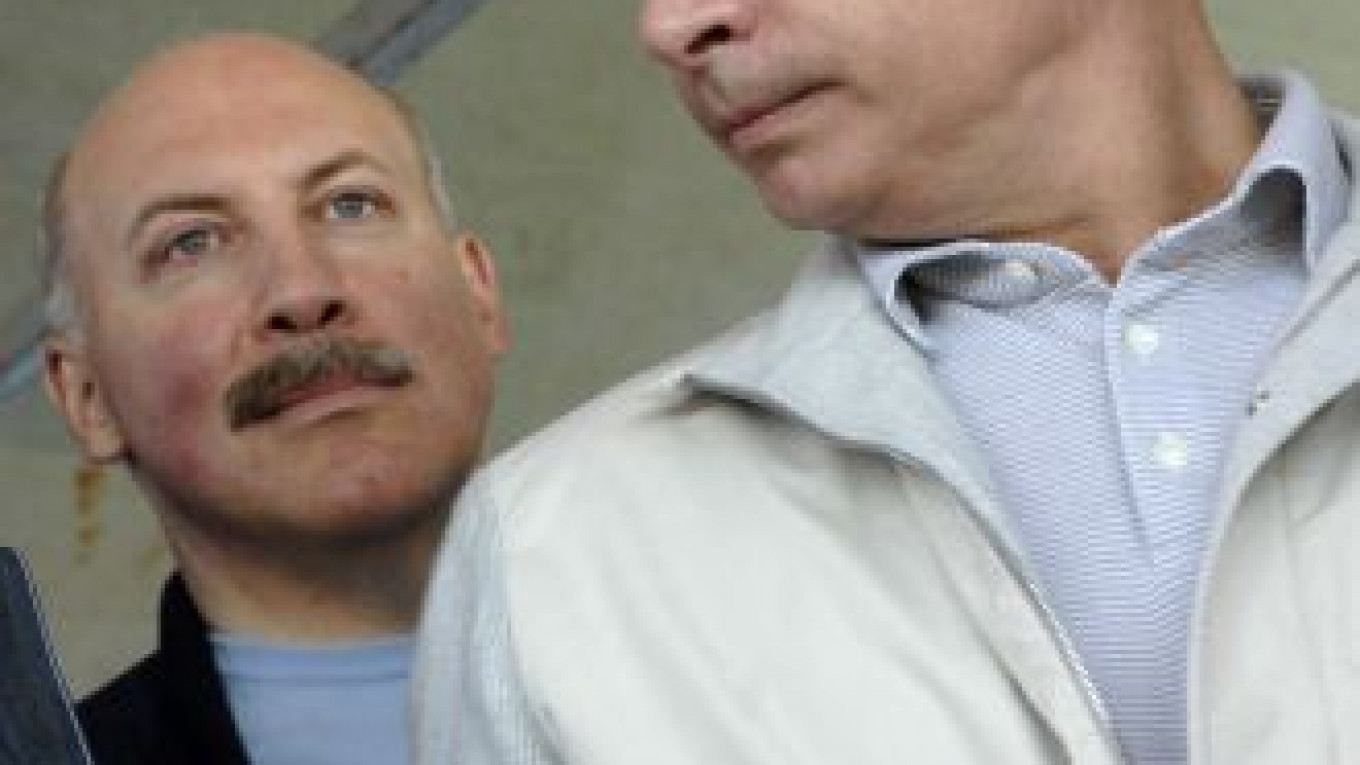President Vladimir Putin on Friday a confidant of billionaire Mikhail Prokhorov as the acting governor of the Irkutsk region, where the metals magnate has a large gold-mining operation and other businesses.
Sergei Yeroshchenko, 50, president of the regional Travel and Recreation Company Eastland, replaces Dmitry Mezentsev, 52, who was appointed by President Dmitry Medvedev in 2009, the Kremlin said Friday.
The of Mezentsev comes as part of a wave of dismissals of unpopular governors ahead of the enforcement of a law restoring direct gubernatorial elections on June 1.
Yeroshchenko served as a close adviser to Prokhorov at his election headquarters in his run for president this year and also headed the regional branch of the pro-business Right Cause party in 2009.
In September, Yeroshchenko left the party along with Prokhorov following the billionaire's short-lived stint as party leader.
Chances look high that Yeroshchenko will remain at the helm in Irkutsk.
In an Friday, Yeroshchenko said he planned to make the region “one of the leaders in Russia,” if he was appointed for a full term.
“I have my own views, and I have been dealing with the regional infrastructure for a long time,” he told Interfax.
Lyudmila Berlina, speaker of the regional legislature, called Yeroshchenko “an experienced manager who lives and works in the Irkutsk region and knows the region's problems well,” according to a on the legislature's website.
Sergei Levchenko, a State Duma deputy with the Communist Party, called Yeroshchenko a successful entrepreneur who was probably a compromise figure agreed on by people close to former Governor Boris Govorin, Rosoboronexport and RusAl chief executive Oleg Deripaska.
Independent political analyst Alexei Titkov, however, suggested that the role of regional elites was minimal in Yeroshchenko's appointment.
Titkov predicted that it could be difficult for Yeroshchenko to gain authority over the local elites after coming from the tourism business.
This year, federal authorities have replaced 21 unpopular governors whose terms would have expired in the next few years, thus delaying direct gubernatorial elections in those regions, Levchenko said.
Several more dismissals are highly likely in the near future, including that of Kaliningrad Governor Nikolai Tsukanov, Levchenko said.
Only four gubernatorial elections are set for this fall, Levchenko said. That is down from 14 gubernatorial elections that had been originally scheduled.
Meanwhile, the dismissal of Mezentsev — who attempted and failed to run for president in March — had been anticipated.
A former Federation Council senator and journalist, his outsider status in the region had complicated political and business ties, Levchenko and Titkov said.
In the three years of his governorship, Mezentsev remained an “alien” to local residents, politicians and businesspeople, Titkov said.
Mezentsev's “activities had been mostly linked to public activities like festivals and others aimed at getting the attention of the federal authorities,” Titkov said.
Mezentsev also failed to secure victories for United Russia in the last two years in mayoral elections in Irkutsk and Bratsk and the State Duma elections in December. Mezentsev himself was among the few governors who was not a member of United Russia.
In the mayoral election, the pro-Kremlin party lost to the Communist Party, while in the Duma elections United Russia won just 35 percent of the vote.
In regional legislature elections next year, Mezentsev would not have been able to secure United Russia's victory and a new governor was needed as soon as possible so he could make changes, Levchenko said.
Moreover, Mezentsev damaged his reputation in June 2011 after ordering his aides to delay a regularly scheduled Aeroflot flight to Moscow for which he was running late.
A few months later, Mezentsev was criticized by Medvedev for failing to douse forest fires around Bratsk, the region's second-largest city.
Ahead of the March 4 presidential election, Mezentsev applied to be a candidate but indicated his loyalty to Putin by claiming that their competition would be "formal" only.
He was denied registration after the Central Elections Commission declared that a large number of signatures that he had submitted for inclusion on the ballot were invalid.
A Message from The Moscow Times:
Dear readers,
We are facing unprecedented challenges. Russia's Prosecutor General's Office has designated The Moscow Times as an "undesirable" organization, criminalizing our work and putting our staff at risk of prosecution. This follows our earlier unjust labeling as a "foreign agent."
These actions are direct attempts to silence independent journalism in Russia. The authorities claim our work "discredits the decisions of the Russian leadership." We see things differently: we strive to provide accurate, unbiased reporting on Russia.
We, the journalists of The Moscow Times, refuse to be silenced. But to continue our work, we need your help.
Your support, no matter how small, makes a world of difference. If you can, please support us monthly starting from just $2. It's quick to set up, and every contribution makes a significant impact.
By supporting The Moscow Times, you're defending open, independent journalism in the face of repression. Thank you for standing with us.
Remind me later.






